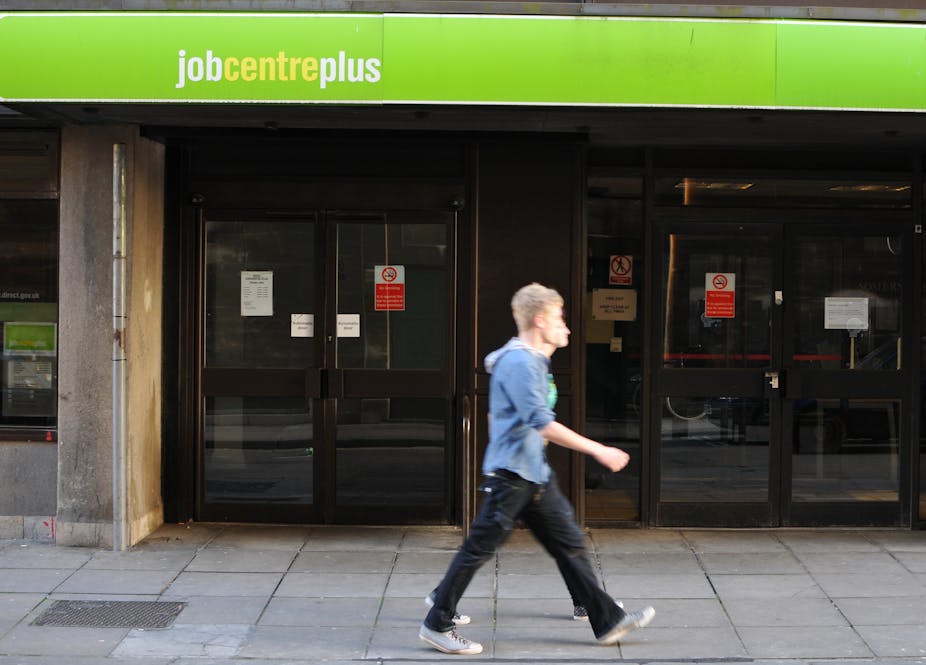Hidden young people are those who are neither in employment, education nor training (NEET), or aren’t claiming the benefits they are entitled to. Roughly 480,000 young people in the UK are estimated to be in this position: they don’t have access to financial assistance, but they’re also excluded from employment-related support offered through Jobcentre Plus and other contracted providers.
Very little is known about what life is like for hidden young people, or how they get by. Now, new research I conducted with colleagues from the University of Salford shines a light on this worrying phenomena, by exploring the views and experiences of 14 young people who have experience of being NEET and hidden, as well as 25 local advice and support agencies, education providers and council officers working with this group.
An image problem?
In some cases, young people didn’t claim the benefits they were entitled to simply because they didn’t know this support was available. One respondent, an 18-year-old woman who was previously among the UK’s hidden young people, told us:
I didn’t know that I could claim … until I was told by the people from [my housing provider] … If not, I wouldn’t have known.
But for others, the stigma attached to claiming benefits deterred them from engaging with the social security system. Another of our respondents, a 20-year-old hidden woman, said:
Like if someone said to me, ‘Where do you get your money from?’ I think I’d be a bit embarrassed to tell them.
Some of the young people we spoke to had developed negative perceptions of Jobcentre Plus services, even though they had no direct experience with them. Rather, they had been deterred from making a claim after hearing about others’ negative experiences.
Pushing people away
Three of our participants had become “hidden” after their bad experiences with Jobcentre Plus services discouraged them from signing on again. One such woman, aged 25 years, told us:
They’re not nice people. They act like they’re better than you and that makes you feel angry because even though you are signing on, it’s not like you’ve never worked before. It’s just not a nice place to go, so I’d rather have nothing than go and sit in their presence.
Several of our respondents felt that the conditions attached to making a claim – such as requirements to apply for high volumes of jobs and attend regular mandatory appointments – made some young people reluctant to engage with the benefits system. And they’re not alone – earlier research projects uncovered similar frustrations among other claimants.

This is likely to affect the success of the government’s new youth obligation, which requires young people to engage in an intensive support programme from day one of their claim, and to apply for an apprenticeship or work placement after six months of unemployment.
Yet among all the people we consulted as part of this project, there was very little awareness of this policy, and how it might affect the Jobcentre Plus service offered to young people. Even though the programme should have already come into effect, information and knowledge about what it involves is scarce.
Parents, crime and cash in hand
The size of the group of hidden young people has doubled in just six years. So how are they getting by? In the absence of income from either employment or benefits, our participants described a range of alternative sources of income - including cash-in-hand jobs and in-kind support through local food banks.
Many had been able to draw on some monetary support from parents, but this was typically not a significant amount. One 20-year-old participant suggested that this could be isolating, because she still couldn’t afford to go out. What’s more, this situation could cause friction within families, as household finances were strained.
Two participants disclosed that they had resorted to criminal activity in the absence of income from other sources:
I was robbing things and I was just finding different ways to get my own money, lending it off people, getting myself in debt.
Excluded from local employment and training opportunities and systems of support, hidden young people represent a significant financial and social cost, experienced by individual people and the households they live with, but also local communities and the wider economy, as talents go unrecognised and some turn to crime in order to survive.
Whether or not hidden young people need or want to draw on financial support from the social security system, not engaging with this system excludes them from mainstream support and services, as most programmes designed to support young people are routed through agencies such Jobcentre Plus.
These agencies urgently need to find ways to engage with people who are eligible for benefits. But there must also be a revival of services and support, such as that provided by the Talent Match programme, for those young people who do not engage with the social security system.

